SCHOLARSHIPS FOR INTERNATIONAL MASTER’S STUDENTS
International students seeking master’s degrees have access to a number of scholarships. Remember that different scholarships and organizations may have different requirements, procedures, and deadlines for applications. You can look into the following general categories of scholarships:

Categories of scholarships
Governmental Awards:
International students can apply for scholarships from numerous nations. The Erasmus Mundus Scholarship (Europe), the Fulbright Program (USA), and the Chevening Scholarship (UK) are a few examples.
Scholarships particular to a university:
For overseas students, the majority of universities provide their own scholarship schemes. For more information, get in touch with the particular universities that interest you.
Scholarships from Private Organizations:
Scholarships for international students are provided by a number of NGOs, foundations, and private organizations. The Gates Cambridge Scholarship, the Soros Foundation, and the Rotary Foundation are a few examples.
Scholarships that are subject-specific:
Certain scholarships are intended for students who want to study in particular fields. Scholarships are available, for example, to students studying the social sciences, the arts, STEM (Science, Technology, Engineering, and Mathematics).
Scholarships in the Region:
There are scholarships that are area-specific. For instance, students from Asian nations can pursue postgraduate studies in Japan through the ADB-Japan Scholarship Program.
Corporate Grants:
Scholarships are available for students studying particular fields from certain businesses and trade associations. Consult with businesses that are related to your topic of study.
Databases for Online Scholarships:
Make use of internet scholarship databases like Chevening, Scholarshipportal, and others. You can look for scholarships using these sites by entering your nation, degree of study, and area of interest.
Organizations that are philanthropic and nonprofit:
Investigate the scholarships offered by foundations and charity groups. These organizations might
Scholarships that are country-specific:
Certain nations offer scholarships only to students from particular regions. For instance, students from developing nations are eligible to apply for the Australian Awards Scholarships.
Sports and Creative Scholarships:
There may be scholarships available if you are talented in sports or the arts and your academic record is good enough.
Verify each scholarship’s eligibility conditions, application procedures, and deadlines. Furthermore, be cautious to investigate and confirm the validity of the scholarship programs you apply to.
ELIGIBILITY CRITERIA

Scholarships for International Master’s Students:
The requirements for eligibility for scholarships might differ significantly based on the school, country, and particular scholarship program. But these are some typical requirements for qualifying that many scholarships might take into account:
Academic Prominence:
Academic merit is a major factor in many scholarships. It can be required of applicants to have a high GPA or comparable academic standing.
Enrollment in a Master’s Degree:
Typically, candidates must be accepted into a Master’s program at an accredited university or be in the process of applying. https://www.wur.nl/en/education-programmes/master/practical-information-masters/scholarships-for-international-masters-students.htm
Citizenship/Nationality:
Some scholarships are only available to residents of particular countries or areas. Verify that you fulfill the requirements associated with your citizenship or place of origin.
Proficiency in Language:
It can be necessary to speak and understand the target language, which is usually English. Standardized language assessments like the TOEFL and IELTS are commonly used to illustrate this.
Letters of Suggestion:
Scholarship applications may need reference letters from instructors, employers, or other people who can attest to the applicant’s qualifications.
Purpose Statement or Personal Declaration:
It is possible for applicants to be required to submit a personal or statement of purpose outlining their academic and professional aspirations, why they are deserving of the scholarship, and how the award will enable them to fulfill their goals.
Expert Experience:
Certain scholarships may include an experience requirement, particularly if they are for particular sectors or areas.
Research Project (if relevant):
Applicants may be required to submit a comprehensive research proposal detailing their proposed research study for Master’s programs that focus on research.
Need for Money:
Some scholarship programs consider an applicant’s need for financial aid or their capacity to pay for their education.
Leadership and Extracurricular Activities:
Certain scholarships take into account an applicant’s leadership positions, extracurricular activities, and volunteer work in the community.
Maximum Age:
Age limitations may apply to some scholarships, especially those for postgraduate study.
Study Area:
Certain subjects or fields of study are the focus of unique scholarships.
It is imperative that you thoroughly review the requirements for qualifying provided by each scholarship provider. The most reliable and current source of information is the scholarship program’s or the awarding institution’s official website. For further information on qualifying conditions, get in touch with the university’s admissions office or the scholarship sponsor if you have any specific scholarships in mind.
APPLICATION REQUIREMENT
Scholarships for International Master’s Students:
The conditions for applying for scholarships can differ greatly based on the school, nation, and particular scholarship program. However, you might run into the following typical application requirements:

Finalized Application:
The majority of scholarship programs demand that you submit an application. You may fill out this form online, and it will ask for information about your personal history, educational background, and other pertinent details.
Transcripts for Academic Work:
To prove your academic accomplishments, you will usually need to provide certified transcripts or academic records from your prior schools.
Recommendation letters:
Letters of recommendation from instructors, employers, or other people who can vouch for your character, work experience, or academic prowess are frequently requested on scholarship applications.
A mission statement or personal statement:
A statement of purpose or personal statement explaining your academic and professional aspirations, your reasons for applying to the program, and how the scholarship will support you in achieving your goals may be required of you.
Curriculum Vitae (CV)/Resume:
A thorough curriculum vitae or resume that shows your academic accomplishments, professional experience, extracurricular activities, and any applicable abilities is required for some scholarships.
Evidence of Linguistic Proficiency:
Standardized examinations like the TOEFL or IELTS may be required to demonstrate your language competency if the language of instruction is not your native tongue.
Research Project (if relevant):
You may be asked to submit a thorough research proposal explaining your desired research project for programs that focus on research.
Financial Records:
Certain scholarships need proof of your financial need or an explanation of why you are unable to pay for your education on your own.
Identity or Passport:
For verification purposes, a copy of your passport or other identity documents can be required.
Portfolio (if relevant):
Applying to a program in the arts, design, or a related field can require you to send in a portfolio of your work.
Interview (if relevant):
Interviews may be necessary for some scholarships as part of the application process. This could take place via video conference, phone, or in person.
For the most accurate and current information regarding application requirements, always visit the official website of the particular scholarship program or get in touch with the scholarship provider directly. Throughout the application process, be careful to adhere to all guidelines and deadlines.
APPLICATION GRADE
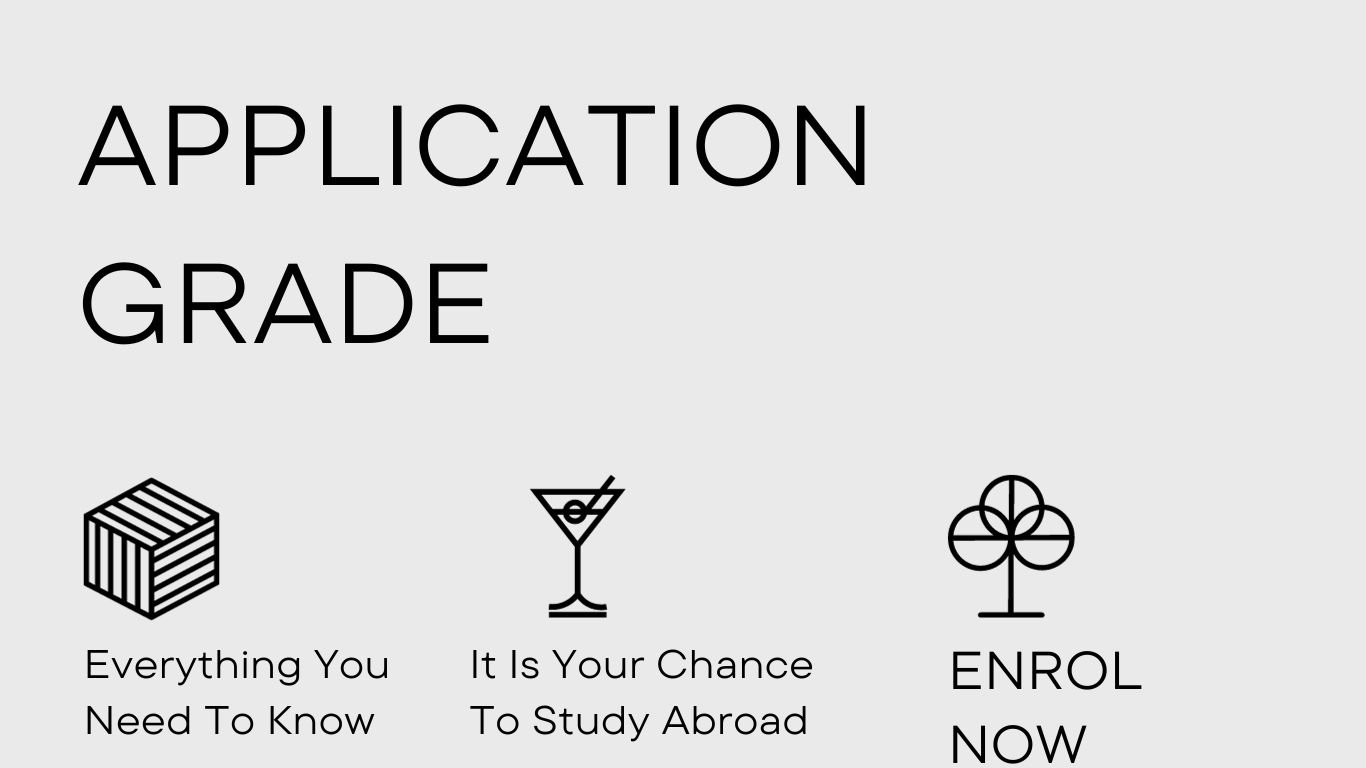
Scholarships for International Master’s Students:
It is not common practice to refer to “Application Grade” in the context of scholarship or college applications. I can offer some information, though, if you’re talking about the GPA or academic standards needed to be admitted to a university or receive a scholarship.
Generally speaking, institutions and scholarship programs have certain academic requirements that applicants must fulfill. This is frequently stated in terms of a required minimum GPA or a specific degree of academic success. Depending on the scholarship sponsor, the degree program (undergraduate, master’s, or PhD), and the subject area, different GPAs may be needed.
For example
Scholarship program may stipulate that candidates must have a GPA of at least 3.0 on a 4.0 scale. Similar to this, universities could have various GPA criteria for Master’s program acceptance.
It’s crucial to carefully go over the prerequisites for admission and eligibility provided by the particular university or scholarship program you are interested in. Usually, the university’s admissions page or the official website of the scholarship giver have this information. You can also get more information about the academic requirements by getting in touch with the admissions office or scholarship committee if you have a certain scholarship or university in mind.
ACADEMIC CRITERIA

Scholarships for International Master’s Students:
The precise rules and requirements pertaining to an applicant’s academic qualifications that must be fulfilled in order for them to be admitted to a program, be eligible for a scholarship, or take advantage of an academic opportunity are referred to as academic criteria. These standards differ amongst organizations, courses, and scholarship suppliers. These are a few typical academic standards:
GPA, or grade point average:
There are several educational initiatives and grants that have minimum GPA requirements. GPAs are frequently expressed on a scale of 4.0, and the minimum GPA required varies based on the program’s or scholarship’s level of competition.
Background in Education:
Certain programs or scholarships could have prerequisites related to schooling. For instance, a Bachelor’s degree in a similar discipline may be required for admission to an engineering master’s program.
Scores on Standardized Tests:
The results of standardized tests like the GMAT (Graduate Management Admission Test) and GRE (Graduate Record Examination) may be required for admission to some programs, especially those at the graduate level.
Language Ability:
It could be necessary to provide proof of language ability for programs taught in a language other than the applicant’s mother tongue. The International English Language Testing System (IELTS) and the TOEFL (Test of English as a Foreign Language) are two popular assessments of language proficiency.
Experience in Research (for Programs Based on Research):
A research proposal or proof of research experience may be required by certain Master’s or Ph.D. programs in addition to the application.
Recommendation letters:
Letters of recommendation from academics or professionals who can vouch for an applicant’s intellectual potential and ability are frequently requested by academic programs and scholarships.
Publications or Accomplishments in Study:
Publications, academic honors, and other noteworthy accomplishments may be taken into account by some programs when evaluating an applicant’s academic standing.
Portfolio (for programs in design and the arts):
A portfolio displaying their artistic or design work may be required of applicants to programs in the arts and design.
Work History (for Programs in Professional Studies):
Relevant work experience may be valued by certain professional Master’s programs, and applicants may need to provide documentation of their professional background.
Tests of Admission (for Particular Fields):
Some fields could ask for supplementary portfolios or admission tests. For instance, a portfolio of design work can be required for architecture schools.
It is imperative that you thoroughly go over the academic requirements provided by the particular program, school, or scholarship that piques your interest. Usually, the official website or application guidelines supplied by the appropriate government have this information. You can get precise information by getting in touch with the scholarship committee or admissions office if you have any special queries or require clarification.
APPLICATION DEADLINE
Scholarships for International Master’s Students: The date by which candidates must turn in all necessary documents and data in order to be evaluated for a scholarship or for admission to a program is known as the application deadline. The application may be rejected if the deadline is missed. It is an important step in the application procedure.
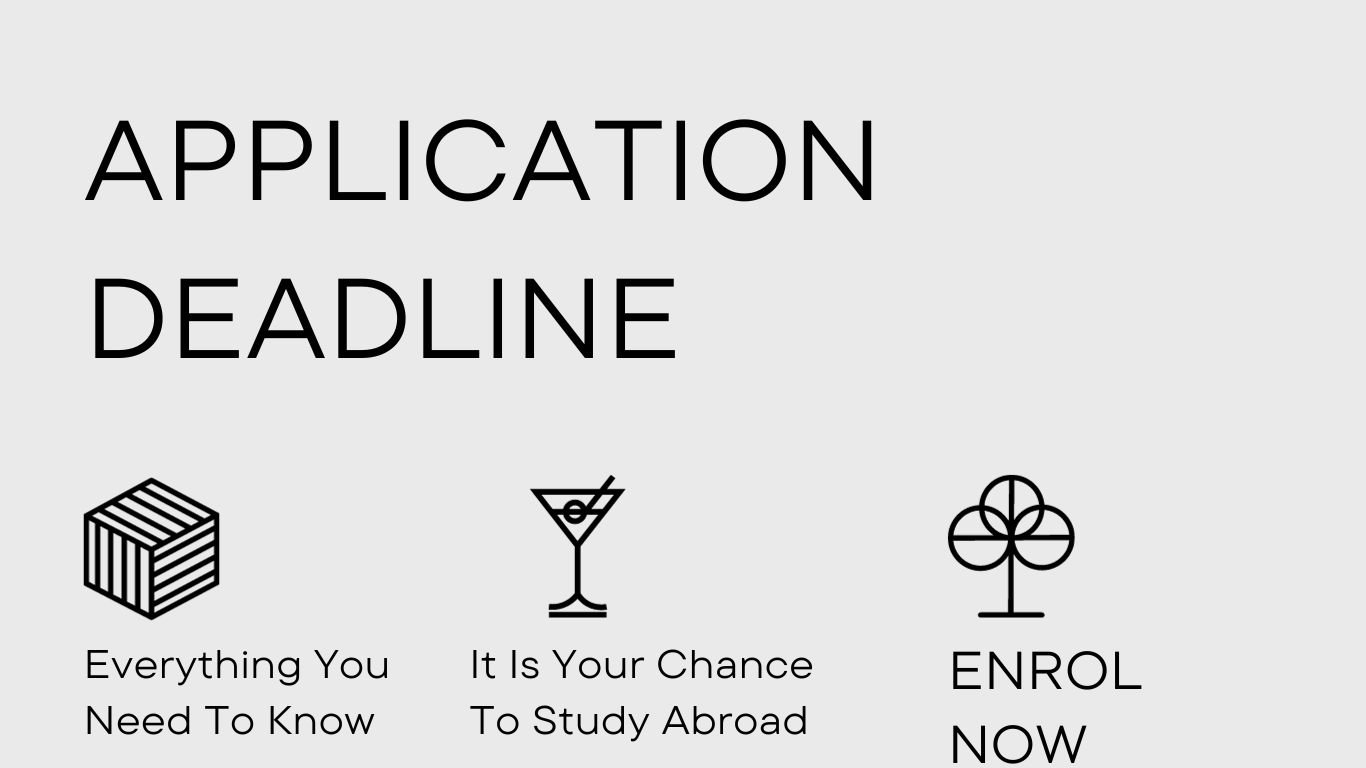
Depending on the school, the particular program, and the kind of scholarship, application deadlines can differ significantly. In relation to application dates, keep the following considerations in mind:
Various Due Dates:
The deadlines for applications may vary throughout universities and scholarship programs. It’s critical to confirm the precise dates for every scholarship or university you are considering. https://wiredinto.com/index.php/2024/01/10/international-scholarship-opportunities/
Deadlines for admission and scholarships:
There are typically dates for application submission for university admissions. Furthermore, if you’re looking for scholarships, keep in mind that there can be several deadlines for your application—they might fall on the same day as the admission due, or they might be earlier.
Early Application Deadlines:
Students can apply early and get an admission decision sooner at certain colleges that offer early admission deadlines. These early deadlines may come with certain benefits and frequently have unusual criteria.
Regular Deadlines for Admission:
The regular dates for application submission are known as regular admission deadlines. Your application will be taken into consideration for the normal admission cycle if you meet these deadlines.
Admissions that Roll:
Some universities provide rolling admissions, which means that applications are evaluated as they come in and acceptance decisions are communicated to applicants continuously. It is advantageous to apply as soon as possible in these situations.
Deadlines particular to scholarships:
There may be deadlines for scholarships that are different from those for university admission. Make sure you are informed about any scholarship deadlines in addition to the university application date.
Taking Time Zone Into Account:
Recognize the time zone in which the application deadline falls. It is important to submit your application well in advance of the deadline in the time zone in which the scholarship sponsor or some institutions may use your application as a reference.
Method of Submission:
Verify the recommended application submission method. While certain organizations and scholarship programs might only accept submissions made online, others might accept hard copies.
Go to the official website of the university or scholarship provider to obtain precise and current information regarding the application deadlines for that particular program. Please feel free to ask questions or seek clarification from the scholarship committee or admissions office.
LEGITIMACY OF SCHOLARSHIP
Scholarships for International Master’s Students: Verifying a scholarship’s validity is essential to avoiding fraud and other potential scams. Here are some pointers to assist you in assessing a scholarship’s validity:
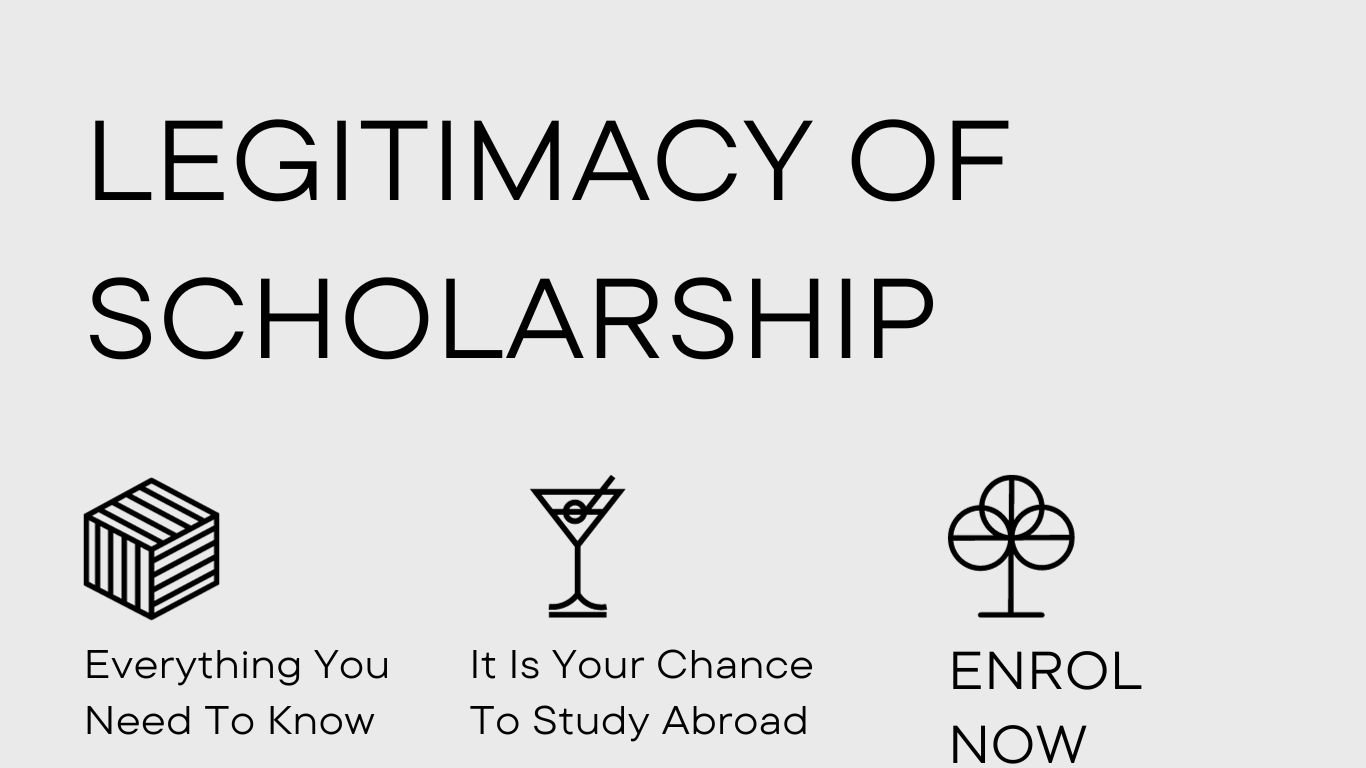
Authorized Sources:
Start by looking through official sources, such as the scholarship provider’s or the university giving the scholarship’s official website. On their official websites, scholarships that are legitimate will provide comprehensive information.
Speak with the Organization:
Get in touch with the organization or educational institution that is offering the scholarship directly. Make use of the official contact details provided on their website to inquire about any clarification or confirmation pertaining to the scholarship program.
Check the Contact Details:
Verify whether the scholarship program’s contact information corresponds with the institution’s or organization’s official contact information. If there are discrepancies or the contact details are not easily accessible, proceed with caution.
Avoid Receiving Unsolicited Emails:
In particular, if you did not apply for the scholarship, exercise caution if you receive unsolicited emails or letters stating that you have won one. A formal application process is usually required for legitimate scholarship programs.
Examine the Company:
Do some research on the foundation or organization providing the scholarship. Authentic establishments will possess a documented past and a distinct objective. If there is a lack of information or the group does not have a reputable web presence, you should be wary.
Verify the Application Fees:
Generally speaking, there are no application costs for legitimate scholarships. If the scholarship source requests payment in advance, proceed with caution as this may indicate fraud.
Examine Testimonials and Reviews:
Seek recommendations or endorsements from prior scholarship winners. Reputable scholarship organizations frequently highlight the successes of its previous winners.
Check the Application Procedure:
Recognize the application procedure. A formal application process is typically required for legitimate scholarships, and it involves providing the necessary paperwork, including recommendation letters, transcripts, and personal statements.
Examine the terms and conditions:
Go over the scholarship’s terms and conditions carefully. Programs that are legitimate will have explicit regulations, eligibility requirements, and standards.
Consider Guaranteed Scholarships With Skepticism:
Offers for scholarships that promise big quantities of money without a competitive selection process or that assure acceptance should be avoided. Achieving a legitimate scholarship is competitive and does not ensure success.
Utilize Reputable Scholarship Resources:
Make use of trustworthy scholarship databases and websites that have a reputation for providing accurate opportunities listings. Government scholarship sites, Fulbright, and Chevening are a few examples.
If you are unsure or worried about a scholarship’s validity, speak with the school immediately or consult a reputable academic advisor or counselor. Prioritize your security and double-check information before submitting any scholarship applications.
SCHOLARSHIP SCHOOLS IN AMERICA
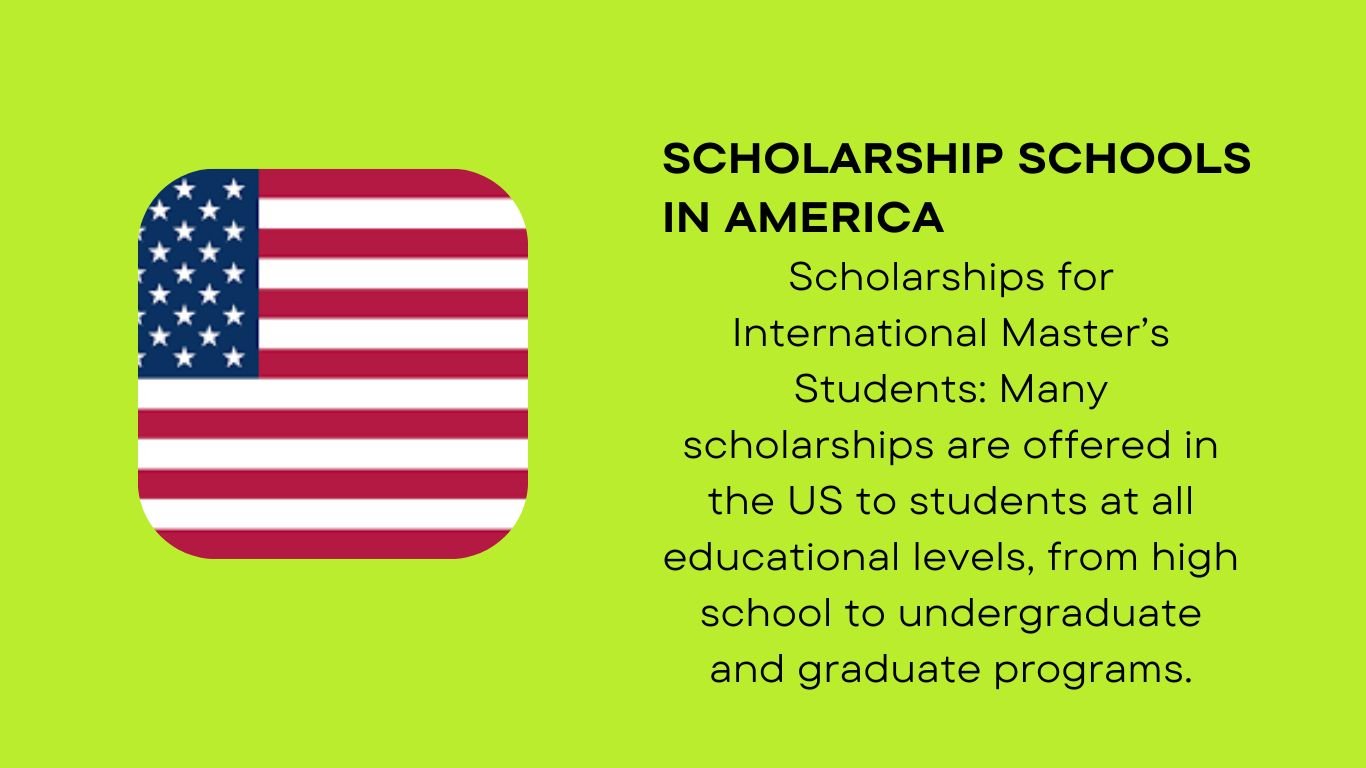
Scholarships for International Master’s Students: Many scholarships are offered in the US to students at all educational levels, from high school to undergraduate and graduate programs. These scholarships may be awarded by governmental bodies, for-profit businesses, foundations, academic institutions, and other establishments. The following are some categories of scholarships and instances of well-known American scholarship programs:
Federal Programs for Student Assistance:
Federal student aid programs, such as loans and grants, are provided by the U.S. Department of Education to assist students in meeting their educational expenses. One frequent application for federal aid is the Free Application for Federal Student Aid (FAFSA).
Academic Merit Scholarships:
Merit-based scholarships based on leadership, extracurricular involvement, and academic accomplishment are available from numerous colleges and private organizations. The Coca-Cola Scholars Program and the National Merit Scholarship Program are two examples.
Scholarships Based on Need:
Scholarships that are need-based consider a student’s financial need. Federal need-based grants include the Pell Grant, while need-based help is frequently provided by colleges through their financial aid offices.
Sports Scholarships:
Colleges and institutions may give athletic scholarships to student-athletes. These scholarships are frequently given out in accordance with sports prowess and accomplishments.
Scholarships for Minorities and Diversity:
Minority groups who are underrepresented can apply for a variety of scholarships. Minority students might find possibilities through organizations such as the Asian & Pacific Islander American Scholarship Fund, the Hispanic Scholarship Fund, and the United Negro College Fund (UNCF).
STEM Fellowships:
Students seeking degrees in STEM fields—science, technology, engineering, and mathematics—are eligible for scholarships. The National Science Foundation (NSF) Graduate Research Fellowship and the Barry Goldwater Scholarship are two such.
Humanities and Arts:
Scholarships are available to students majoring in the humanities, arts, or literature through university programs or organizations such as the National Endowment for the Arts (NEA).
Community Service:
A few scholarships are given to students who demonstrate a commitment to community service. One illustration of this type of scholarship is the Prudential Spirit of Community Awards.
Scholarships for the Military:
For those thinking about enlisting in the military, there are numerous military scholarships available. The GI Bill for veterans and scholarships offered by the Reserve Officer Training Corps (ROTC) are two examples.
Scholarships for Study Abroad:
Scholarships such as the Fulbright Program and the Benjamin A. Gilman International Scholarship are available to students who want to study abroad.
Particularized Scholarships:
Some scholarships are restricted to certain disciplines or passions. The Vegetarian Resource Group, for example, provides scholarships to students who advocate for vegetarianism.
Don’t forget to review each scholarship program’s unique qualifying conditions, application procedures, and deadlines. Investigate your options for scholarships at each university as well, since many of them have their own scholarships to help students.
SCHOLARSHIP SCHOOLS IN UK
A range of scholarships are offered to international students studying undergraduate, graduate, and doctorate degrees in the United Kingdom. Private, public, and university groups all provide these scholarships. The following are some categories of scholarships and instances of well-known UK scholarship programs:
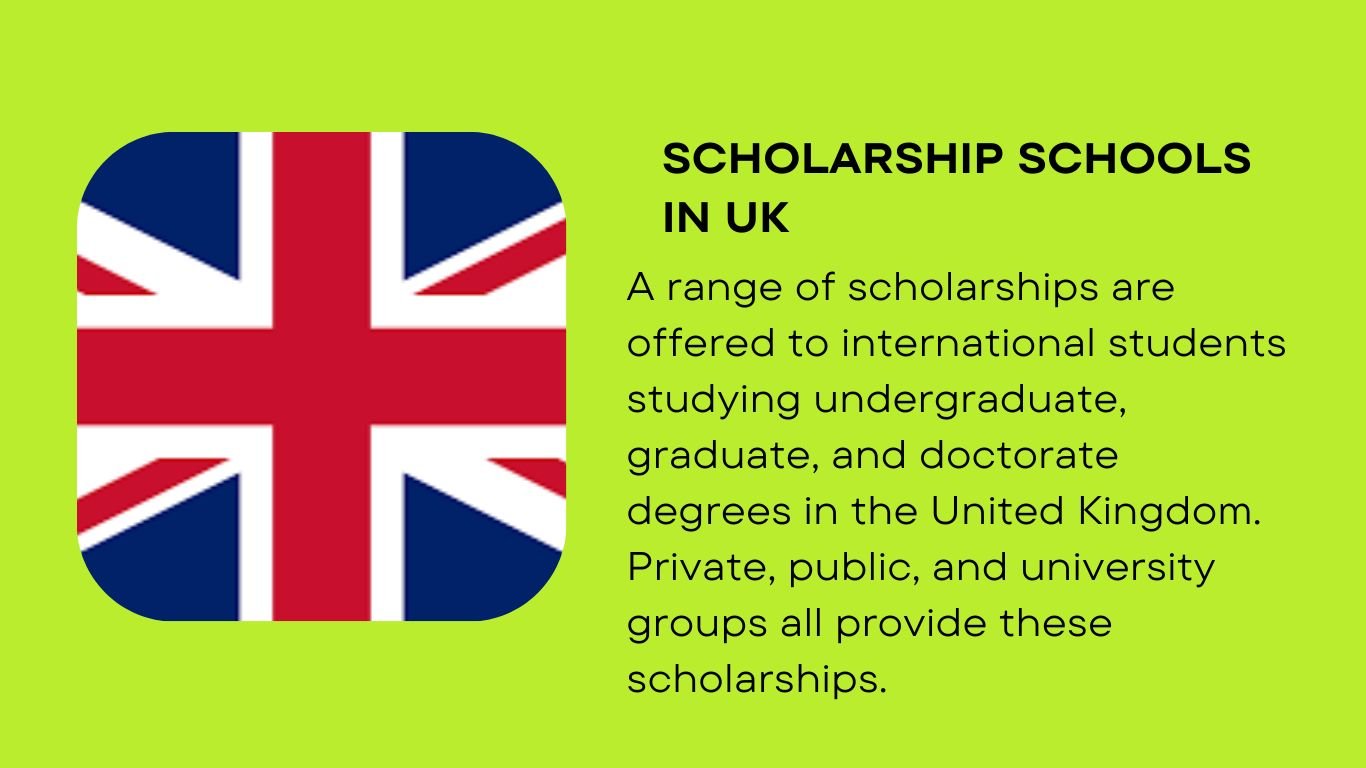
Scholarships from Chevening:
The UK government sponsors the esteemed Chevening Scholarships. These are offered to deserving students worldwide and pay for living expenses, tuition, and other benefits.
Scholarships from the Commonwealth:
Citizens of Commonwealth nations are eligible to apply for Commonwealth Scholarships to study in the UK. The Commonwealth Scholarship Commission provides funding for these scholarships, which span a number of academic fields.
Scholarships from Gates Cambridge:
Outstanding candidates from any nation outside the UK are given the opportunity to undertake postgraduate studies at the University of Cambridge through the Gates Cambridge Scholarships. These scholarships offer extra allowances in addition to full tuition coverage.
Rhodes Awards:
The University of Oxford offers famous Rhodes Scholarships for postgraduate study. They pay living expenses, travel expenses, and tuition fees and are available to deserving students from particular nations.
Scholarships offered by British Chevening/Chevening Partners:
Some UK colleges work with the Chevening program to give Chevening Partner Scholarships in addition to the main Chevening Scholarships. These scholarships could be restricted to particular colleges or academic specialties.
Scholarships from Clarendon Fund:
Graduate students in a variety of fields can apply for scholarships from the University of Oxford’s Clarendon Fund. The scholarships offer a sizable stipend in addition to covering tuition.
Shared Scholarships of the Commonwealth:
Applicants from low- and middle-income Commonwealth nations are eligible for the Commonwealth Shared Scholarships. These scholarships give a living allowance in addition to covering the cost of tuition.
Joint Master’s Degrees Erasmus Mundus:
Joint master’s degrees are available through the Erasmus Mundus program in association with several European universities. Students from the EU and outside the EU are eligible for scholarships.
The Outstanding Scholarships:
The UK government and several universities jointly sponsor the GREAT Scholarships program. Their purpose is to aid students from particular nations in their academic pursuits at universities in the United Kingdom.
Scholarships particular to a university:
International students can apply for scholarships offered by numerous UK universities. These could be determined by certain standards pertaining to the university’s principles, leadership abilities, or academic excellence.
It’s crucial to review each program’s unique qualifying requirements, application procedure, and deadlines while thinking about scholarships in the UK. Investigate scholarship options at the specific colleges to which you intend to apply.
SCHOLARSHIPS SCHOOLS IN EUROPE
Scholarships for International Master’s Students: International students can apply for numerous scholarships offered by different European countries. Certain colleges, the European Union, individual European nations, and private groups may all provide these scholarships. Here are a few instances of European scholarship programs:
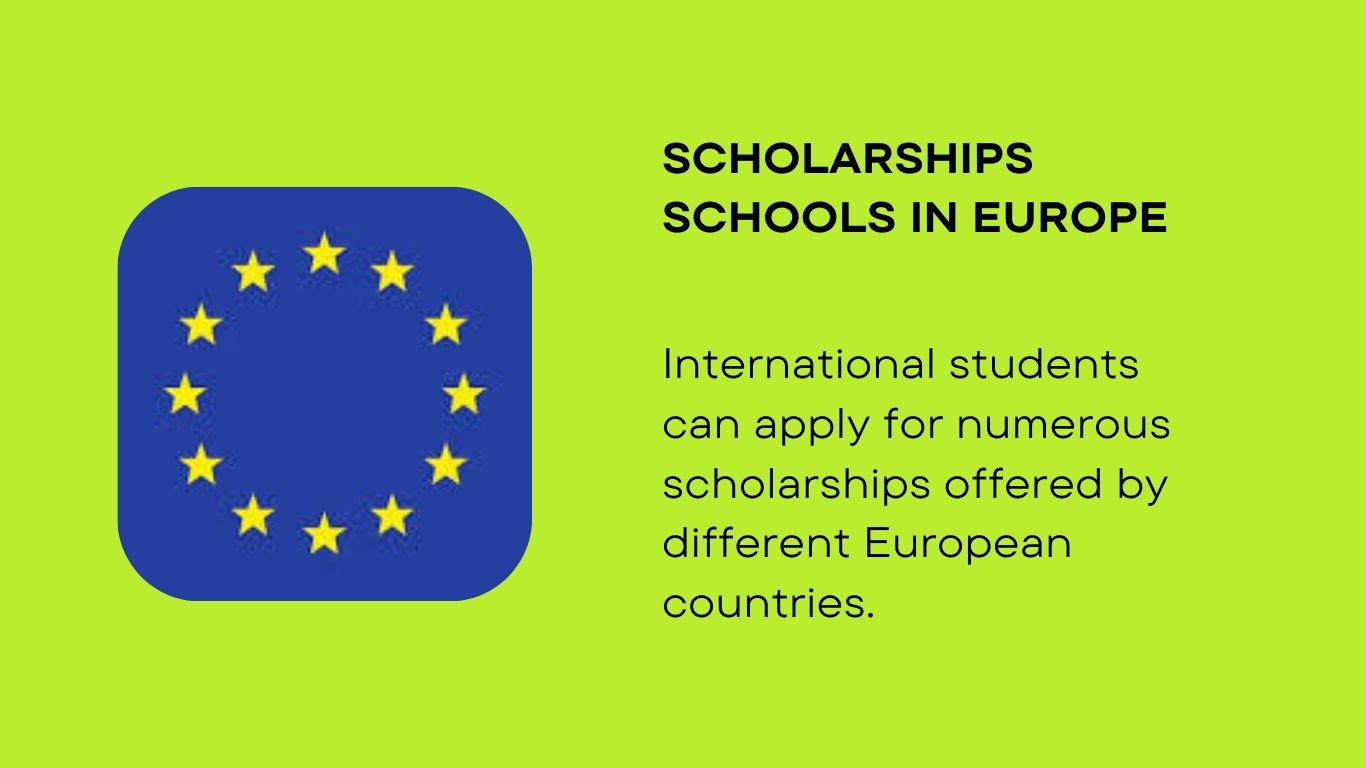
Scholarships Erasmus+:
Students can study abroad at partner universities in Europe with scholarships offered by the European Union’s Erasmus+ program. Additionally, it offers collaborative master’s degree programs and staff exchanges.
Scholarships for Excellence awarded by the Swiss Government:
Foreign researchers and students can apply for scholarships from the Swiss government to continue their postgraduate studies or research in Switzerland. Both tuition and living expenses are covered by these scholarships.
Scholarships from the Dutch Government:
International students can study in the Netherlands with the help of several scholarships provided by the Dutch government. The Orange Knowledge Programme and the Holland Scholarship are two examples.
German DAAD Scholarships:
International students can apply for numerous scholarships from the German Academic Exchange Service (DAAD) to study in Germany. These scholarships are available for a range of subjects and academic levels.
Fulbright Initiative (Several European Nations):
Education exchanges between the United States and other nations—including a number in Europe—are made possible by the Fulbright Program. It provides scholarships to professionals, academics, and students.
The French Eiffel Excellence Scholarship Program:
The French Ministry for Europe and Foreign Affairs offers the Eiffel Excellence Scholarship Program in an effort to draw exceptional international students to study master’s and doctoral degrees in France.
Italy’s Bologna University Study Grants:
International students who meet academic quality requirements can apply for study grants and tuition price waivers from the University of Bologna in Italy.
Scholarships for International Education offered by the Irish Government:
International students from outside the European Union are eligible to apply for scholarships from the Irish government to pursue undergraduate and graduate degrees in Ireland.
Swedish Institute Fellowships for International Workers:
The Swedish Institute provides funding for master’s degrees in Sweden with an emphasis on subjects vital to the nation’s advancement.
Scholarships for Central and Eastern Europe through CEEPUS:
Scholarships for study or teaching abroad are offered by CEEPUS (Central European Exchange Program for University Studies) to scholars and students from Central and Eastern European nations.
Visegrad Fund Scholarships (Countries in the Visegrad Group):
For the purpose of studying or conducting research in the Visegrad Group (the Czech Republic, Hungary, Poland, and Slovakia), the Visegrad Fund provides scholarships to artists, researchers, and students from these nations.
It’s crucial to review the precise eligibility requirements, application specifications, and deadlines for each program while looking into scholarship options in Europe. Furthermore, think about looking into the scholarship programs offered by certain colleges in the nation where you want to study.
SCHOLARSHIPS SCHOOLS IN AUSTRALIA
Scholarships for International Master’s Students: Australia provides a range of scholarships at various academic levels to international students. Universities, other groups, and the Australian government can all offer these scholarships. Here are a few instances of Australian scholarship programs:
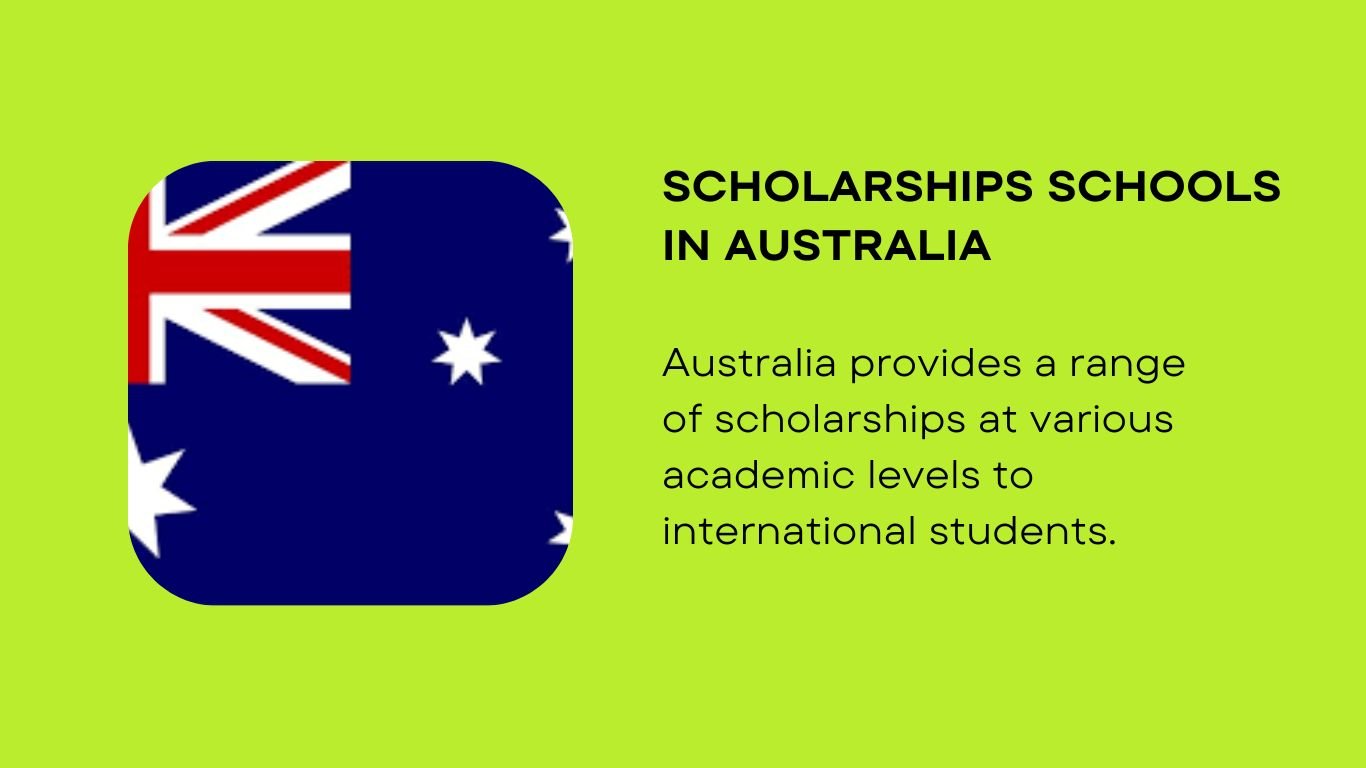
Australia Grants Scholarships:
The Australian government provides the coveted Australia Awards Scholarships, which enable overseas students from impoverished nations to study undergraduate or graduate degrees in Australia.
Program for Endeavour Leadership:
An Australian government program called the Endeavour Leadership Program offers financial aid to foreign students wishing to study, do research, or advance their careers in Australia.
https://wiredinto.com/index.php/2024/01/09/international-students-scholarship/
Program for Research Training (RTP):
For overseas students pursuing research degrees (Master’s by Research or Ph.D.) at Australian universities, the Research Training Program offers stipend scholarships and tuition fee offsets.
Research Scholarships from the Australian Government (AGRTP):
International students enrolled in postgraduate research programs at participating Australian universities are eligible to apply for scholarships under the AGRTP.
Women in Research Fellowship at APEC for Australia:
The Australian government is supporting women’s economic empowerment in the APEC area with this fellowship. It gives female scholars from APEC member nations the chance to conduct research in Australia.
Scholarship for Destination Australia:
The purpose of the Destination Australia Scholarship is to encourage and assist both domestic and foreign students to pursue their studies in regional Australia. Students enrolled in courses at qualified regional campuses are eligible for financial assistance.
Scholarships particular to a university:
For overseas students, numerous Australian universities provide their own scholarships.
Postgraduate Awards in Australia (APA):
Individual universities offer the Australia Postgraduate Awards to assist overseas students pursuing postgraduate research degrees.
Research Scholarships in Melbourne:
For overseas students pursuing graduate degrees focused on research, the University of Melbourne offers the Melbourne Research Scholarships.
Sydney Scholars Awards:
Based on academic performance, international students can apply for partial scholarships from the University of Sydney through the Sydney Scholars Awards.
Scholarship for Monash International Merit:
The International Merit Scholarship is provided by Monash University to assist deserving overseas students who wish to pursue undergraduate or graduate degrees.
Make sure you thoroughly study each scholarship program’s qualifying rules, application procedures, and deadlines before applying for scholarships in Australia. The official websites of the pertinent colleges or scholarship sources have comprehensive information.
SCHOLARSHIPS SCHOOLS IN ASIA
Scholarships for International Master’s Students: Students in Asia have access to a wide range of scholarships provided by different governments, organizations, and educational establishments. However, depending on the nation and particular educational institution, the availability and requirements for scholarships can differ significantly. Here are some instances of scholarship initiatives in various Asian nations:

Chinese Government Scholarship (CSC):
The Chinese government provides financial aid for study in China at different academic levels to foreign students, especially those from Asia.
Japanese Government Scholarships (MEXT):
For undergraduate and graduate study, the Ministry of Education, Culture, Sports, Science, and Technology (MEXT) of Japan offers scholarships to foreign students, especially those from Asia.
Korean Government Scholarship (KGSP):
Asian students in particular are eligible for scholarships from the Korean government for undergraduate, master’s, and doctorate degrees.
Taiwan Scholarship Program:
The Taiwanese government provides scholarships to foreign students, particularly those from Asia, for undergraduate and graduate studies.
Scholarships from the Association of Southeast Asian Nations (ASEAN):
Students from ASEAN member nations are eligible to apply for scholarships from ASEAN to pursue undergraduate or graduate courses in other ASEAN member nations.
Scholarships for MBA students from Asia:
This scholarships are available from the business school INSEAD, which has campuses in Asia, Europe, and the Middle East.
The Hong Kong government:
Offers fellowships to international students, particularly those from Asia, so they can pursue doctoral studies in Hong Kong.
The Asian Development Bank-Japan Scholarship Program (ADB-JSP):
Offers postgraduate scholarships at participating Asian institutions for study in economics, management, science, technology, and other development-related subjects.
Malaysia International Scholarship (MIS):
The government of Malaysia provides financial aid to foreign students, particularly those from Asia, so they can pursue postgraduate studies there, thus encouraging students interest for study
For the most recent details on available scholarships, eligibility requirements, and application processes, it is imperative to verify with particular colleges, governmental bodies, and scholarship organizations in each nation. Therefore, Students can also look via databases and portals for overseas scholarships to identify opportunities that align with their interests and academic ambitions for a profitable career.

